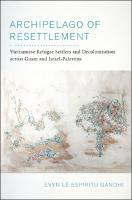Archipelago of Resettlement
Vietnamese Refugee Settlers and Decolonization across Guam and Israel-Palestine
| dc.contributor.author | Gandhi, Evyn Lê Espiritu | |
| dc.date.accessioned | 2022-04-25T09:24:57Z | |
| dc.date.available | 2022-04-25T09:24:57Z | |
| dc.date.issued | 2022 | |
| dc.identifier | OCN: 1275432022 | |
| dc.identifier.uri | https://library.oapen.org/handle/20.500.12657/54159 | |
| dc.description.abstract | From April to November 1975, the US military processed over 112,000 Vietnamese refugees on the unincorporated territory of Guam; from 1977 to 1979, the State of Israel granted asylum and citizenship to 366 non-Jewish Vietnamese refugees. Evyn Lê Espiritu Gandhi analyzes these two cases to theorize what she calls the refugee settler condition: the fraught positionality of refugee subjects whose resettlement in a settler colonial state is predicated on the unjust dispossession of an Indigenous population. This groundbreaking book explores two forms of critical geography: first, archipelagos of empire, examining how the Vietnam War is linked to the US military buildup in Guam and unwavering support of Israel, and second, corresponding archipelagos of trans-Indigenous resistance, tracing how Chamorro decolonization efforts and Palestinian liberation struggles are connected through the Vietnamese refugee figure. Considering distinct yet overlapping modalities of refugee and Indigenous displacement, Gandhi offers tools for imagining emergent forms of decolonial solidarity between refugee settlers and Indigenous peoples. This is a phenomenal book that takes seriously the implication of Indigenous calls for place-based scholarship to refugee and migration studies and ups the ante by engaging the accountabilities such calls demand. Evyn Lê Espiritu Gandhi exemplifies the possibilities of reading ‘archipelagically’ across Indigenous and Asian American studies, across settler colonies, and against US militarism and empire.” JODI A. BYRD, author of The Transit of Empire This strikingly original study demonstrates ways of knowing and connection otherwise— within, across, and beyond incommensurable structural divides and multiple belongings. Deeply inspiring, Gandhi’s archipelagic methodology elucidates compelling political possibilities for decolonial futures.” LISA YONEYAMA, author of Cold War Ruins | en_US |
| dc.language | English | en_US |
| dc.subject.classification | thema EDItEUR::N History and Archaeology::NH History::NHK History of the Americas | en_US |
| dc.subject.classification | thema EDItEUR::J Society and Social Sciences::JB Society and culture: general::JBF Social and ethical issues::JBFG Refugees and political asylum | en_US |
| dc.subject.other | American Studies; Refugee Studies | en_US |
| dc.title | Archipelago of Resettlement | en_US |
| dc.title.alternative | Vietnamese Refugee Settlers and Decolonization across Guam and Israel-Palestine | en_US |
| dc.type | book | |
| oapen.identifier.doi | 10.1525/luminos.123 | en_US |
| oapen.relation.isPublishedBy | 72f3a53e-04bb-4d73-b921-22a29d903b3b | en_US |
| oapen.relation.isFundedBy | 59fc683c-c8e7-4dbc-a128-cd678d483ff0 | en_US |
| oapen.relation.isbn | 9780520379657 | en_US |
| oapen.pages | 285 | en_US |
| oapen.remark.public | Funder name: Arcadia, a charitable fund of Lisbet Rausing and Peter Baldwin |

